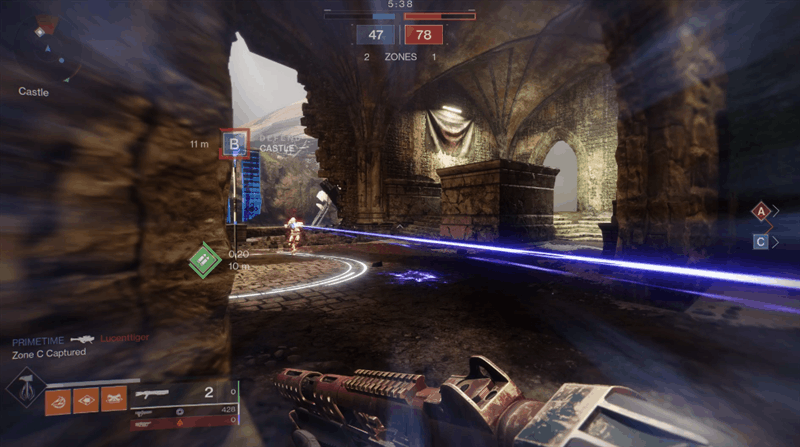Bungie has changed a lot of things about Destiny over the last four years, but only rarely have there been changes as sweeping as today’s 2.0 patch. Destiny 2 now plays significantly differently than it did yesterday.
Today’s 2.0 patch paves the way for next week’s Forsaken expansion, which the optimistic among us hope will be a Taken King-style overhaul that revitalises the game after its tumultuous first year. The new patch changes more things than I have time to list here, so go read the full patch notes if you want all those details. Among the most noteworthy changes: melee attacks are getting buffed; Titan shoulder-charges will be a one hit kill in crucible; a number of exotic armour pieces are getting buffs; milestones have been overhauled and rearranged in the Director; infusion now requires planetary materials; and mods have been removed entirely in anticipation of a new mod system coming next week. More noticeable than any of those changes is the new weapon system, which combines elements of the systems from both Destiny 1 and Destiny 2 at launch.
I’ve played about an hour with the new weapon system, so I have only a preliminary sense of how it works. It’s a lot of fun in some obvious ways, even if it’s tough to initially get your head around. It’s both more flexible than the year-one weapon system, but also more limiting in some unexpected ways. If you’ve never played Destiny, it will probably make sense. But if you have played Destiny, it’s much more confusing, because it requires you to unlearn some stuff you’ve spent years internalising.
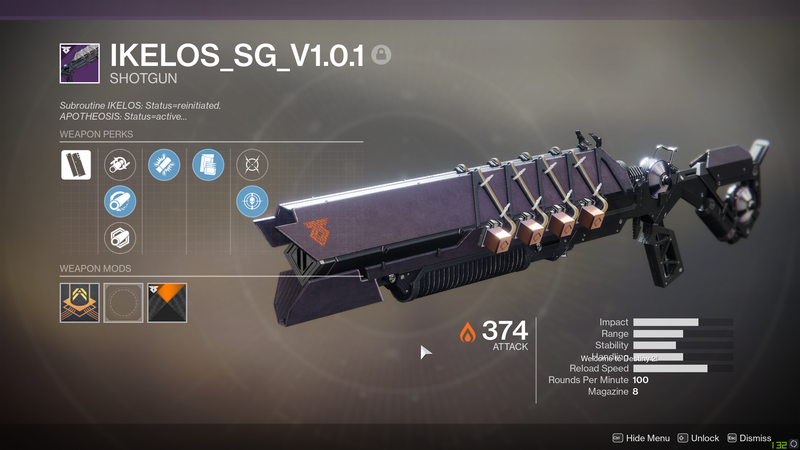

In the first Destiny, you had your primary guns, your special guns, and your heavy guns. Primaries were guns like hand cannons, pulse rifles, and auto rifles. Special guns were more powerful weapons like shotguns, sniper rifles, and fusion rifles. Heavies were the most powerful of all, like rocket launchers, swords, and linear fusion rifles. Every gun did either kinetic damage or energy damage (you know: fire, lightning, or purple); guns that did energy damage were more specialised and useful against certain types of enemy shields. Most primary weapons did kinetic damage, and all special and heavy weapons did some sort of energy damage. You’d get a solar shotgun, or an arc rocket launcher, that sort of thing.
Bungie overhauled that system for the first year of Destiny 2. There were still three slots, but they worked completely differently. Instead of primary/special/heavy, guns were now broken up into kinetic/energy/power, according to the ammo they took. Kinetic and energy guns were all the guns previously thought of as “primary” weapons, while the more powerful stuff, including previous special weapons like shotguns, sniper rifles, and fusion rifles, were now lumped in under the “power” slot. Many players hated this change, since it reduced the number of powerful weapons a player could equip at once. In the first game, you could equip a shotgun and a rocket launcher, but in the sequel, you had to pick one or the other.
The new system, introduced in today’s patch, is a hybrid of those two predecessors. Weapons are still categorised by the type of damage they do (kinetic, energy, power), but that categorisation has been de-coupled from the type of ammo they take.
For starters, each weapon archetype now falls into one of three ammo categories: primary, special, and heavy. Here’s how they all break down, per Bungie:
Primary Ammo Weapons: Hand Cannons, Scout Rifles, Auto Rifles, Pulse Rifles, Sidearms, Submachine Guns
Special Ammo Weapons: Fusion Rifles, Shotguns, Sniper Rifles, Trace Rifles, Single Shot Grenade Launchers
Heavy Ammo Weapons: Drum-Loaded Grenade Launchers, Rocket launchers, Linear Fusion Rifles, Swords
Pretty straightforward, right? So the next thing to get your head around is ammo, which still drops in the game as white, green, or purple pickups. White ammo bricks go to primary guns like hand cannons and auto rifles. Green ammo bricks drop less often, and are used on special weapons like sniper rifles and shotguns. Purple heavy bricks are the rarest, and you use them for heavy weapons like rocket launchers and swords.
That all probably seems pretty easy to follow, too. Here’s where it gets weird, at least for longtime Destiny players. You still have three weapon slots, meaning you can equip three weapons at once. In your inventory, your weapons are now organised not by ammo type (primary/special/heavy) but according to their damage type: kinetic/energy/power. That means all kinetic guns, including special guns, can only be equipped in your first “kinetic” slot. All energy guns, including both primary and special energy guns, have to go in your second, “energy” slot. Power weapons all do elemental damage, take heavy ammo, and all sit in your “power” slot.
For a balanced loadout, I can easily roll with the raid hand cannon in my kinetic slot, the Ikelos shotgun in my energy slot, and the raid rocket launcher in my power slot, like so:
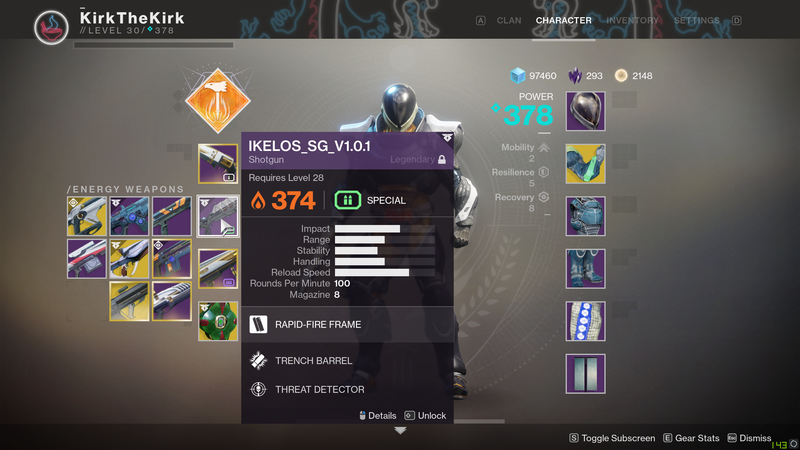

Thats a killer loadout, and gives me one weapon for each type of ammo. But if I want to use the exotic Polaris Lance scout rifle as my primary gun — it’s a scout rifle, so it takes primary ammo — I still have to equip it in the energy slot, because it does solar energy damage. I can’t pair it with the Ikelos shotgun I was just using, since I can’t equip two energy weapons at the same time. In order to pair it with a shotgun, I have to pair it with a kinetic shotgun like Hawthorne’s Field-Forged Shotgun, like so:
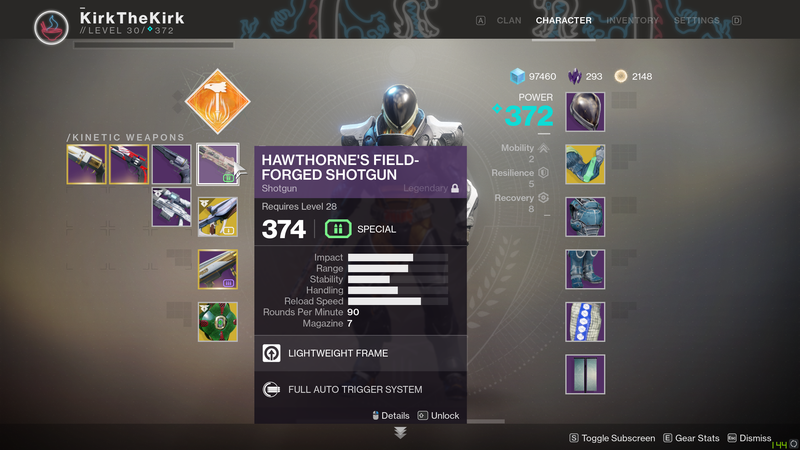

I’ll still have one weapon for each ammo type — Polaris Lance takes primary ammo and Hawthorne’s shotgun takes special ammo — but they’ll be in a different order. In practice, it’s more or less the same as that first loadout, except that I have to internalise that a single tap of the weapon-swap key gets me my special gun, while a double-tap gets to my primary. That’s the reverse of how it’s always worked in the past, and one of those muscle-memory things that’ll be hard to unlearn.
If I wanted to play with a weird loadout like, say, three shotguns, I’d have to do it like this:
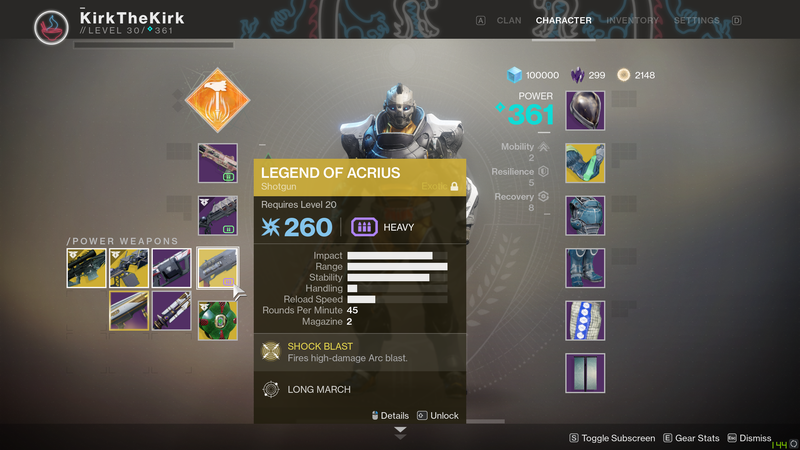

I’d need to put a kinetic shotgun (Hawthorne’s) in the kinetic slot, an energy shotgun (Ikelos) in the energy slot, and a heavy-ammo shotgun in the power slot. Legend of Acrius is one of two heavy shotguns in the game, so that’s what I’d have to go with. If I did use this loadout, it would mean my top two shotguns would split my special ammo reserves, while the Legend of Acrius would use heavy ammo. I wouldn’t have anything using primary ammo, so it would be an unbalanced loadout.
It’s hard to say how well the new system works once you pick a loadout and start playing, though my initial impressions are positive. Despite the fact that it feels like one weapons system jury-rigged onto another (because it is), it seems like a clear change for the better. In PvE, it’s super fun to be back as a Titan leaping into the fray with a hand cannon and shotgun like the glory days of the first Destiny. I hopped into Escalation Protocol with randoms on Mars and we got all the way to the seventh and final phase, which I attribute at least in part to the fact that everyone was carrying much heavier firepower than they could before today. It felt liberating to use a high-power weapon like a shotgun as freely as I was, without constantly hoping for rare purple ammo drops.
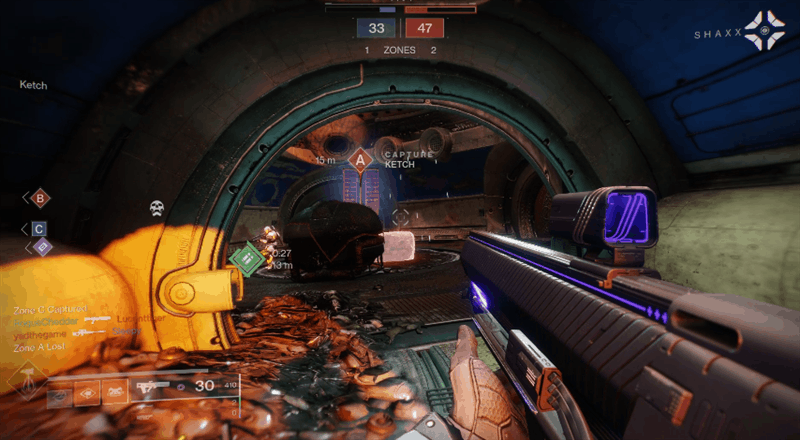

I also played a quick round in the crucible, which was enough to make it clear that Crucible is going to be so wildly different that it’s currently impossible to know how everything will shake out. People sure were shotgunning and sniping like it was 2015 all over again. Whether that’s a good or a bad thing, I can’t yet say.
It’s going to take some time to adjust to the new system, particularly given that Destiny 2 is about to go through a bunch more changes next week when Forsaken actually hits. For now, I’m gonna head back into Crucible and enjoy my newly buffed shoulder-charge.
